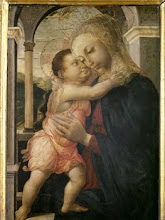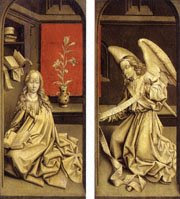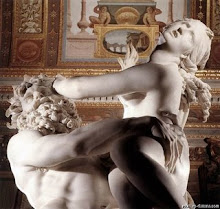



BOR, Paulus
(b. 1605, Amersfoort, d. 1669, Amersfoort)
Biography
Dutch painter. He came from a prominent and wealthy Catholic family. In 1577 his grandfather Bor Jansz. was a member of the Treffelicxte, a group of the most exceptional citizens of Amersfoort. His father, also named Paulus Bor, was a textile merchant. Coming from a wealthy family he probably did not need to paint for an income. This might explain his preference for subjects rarely painted by other artists, such as Ovide' tale of Cydippe, in the Rijksmuseum, Amsterdam, and also why his depictions of single and sometimes melancholic female figures strike us as unusual.
Nothing is known about Paulus Bor's youth. He went to Italy in 1623. The earliest record of him is a document from 1623, which says he was living in a house in the parish of Sant' Andrea dell Fratte in Rome with three other painters, whose names are no longer known. In 1624 and 1625, he shared a home in Piazza di Spagna and subsequently one in Strada dell'Olmo with the Hoorn painter Jan Linsen and the Italian Michelangelo Cerquozzi. In Rome Paulus Bor was one of the founders of a group of artists known as the 'bentvueghels'. He is portrayed with his companions in a drawing at the museum in Rotterdam. Bacchus, the god of wine, is seated in the middle, with Bor and his friend Jan Linsen on either side. Bor's name is given as 'Paolus Borro Alias Orlando', Jan Linsen's as 'Joan Linsen, Alias Hermafrodito'.
In 1626, Bor was back in Amersfoort, where he was a member of the Brotherhood of St Luke. A short time later, in 1628, he painted a very large family portrait (120 x 320 cm) with no fewer than thirteen people. This picture is now in the Pieters en Blokland Gasthuis in Amersfoort. After his return to the Netherlands, his pictures do reflect the prevailing local Caravaggesque style, but are more classicizing, and are reminiscent of painters elsewhere in the Netherlands, such as Pieter de Grebber in Haarlem and Caesar van Everdingen in The Hague.
In 1632, Paulus Bor married Aleijda van Crachtwijck. Their combined assets in property and documents at the time of their marriage amounted to 10,000 guilders, which gives us some idea of the extent of their wealth. The couple had several children.
In the meantime Bor had made such progress that Jacob van Campen engaged him to work on the decoration of Frederik Hendrik's palace at Honselaarsdijk, which has unfortunately since been destroyed. The two Amersfoort artists remained in touch with one another until Van Campen's death in 1657. Due to the close contact of the artists, some of Campen's classicist works have been confused with those of Bor.
In 1656, Bor, who was a Catholic, became regent of the almshouse 'De Armen de Poth'. He painted an overmantel for one of its rooms, which can still be seen there today. Paulus Bor died on 10 August 1669. His friends attending the funeral marked the occasion in the spirit of the deceased, it would seem, by downing a barrel of wine.
























.jpg)

.jpg)










